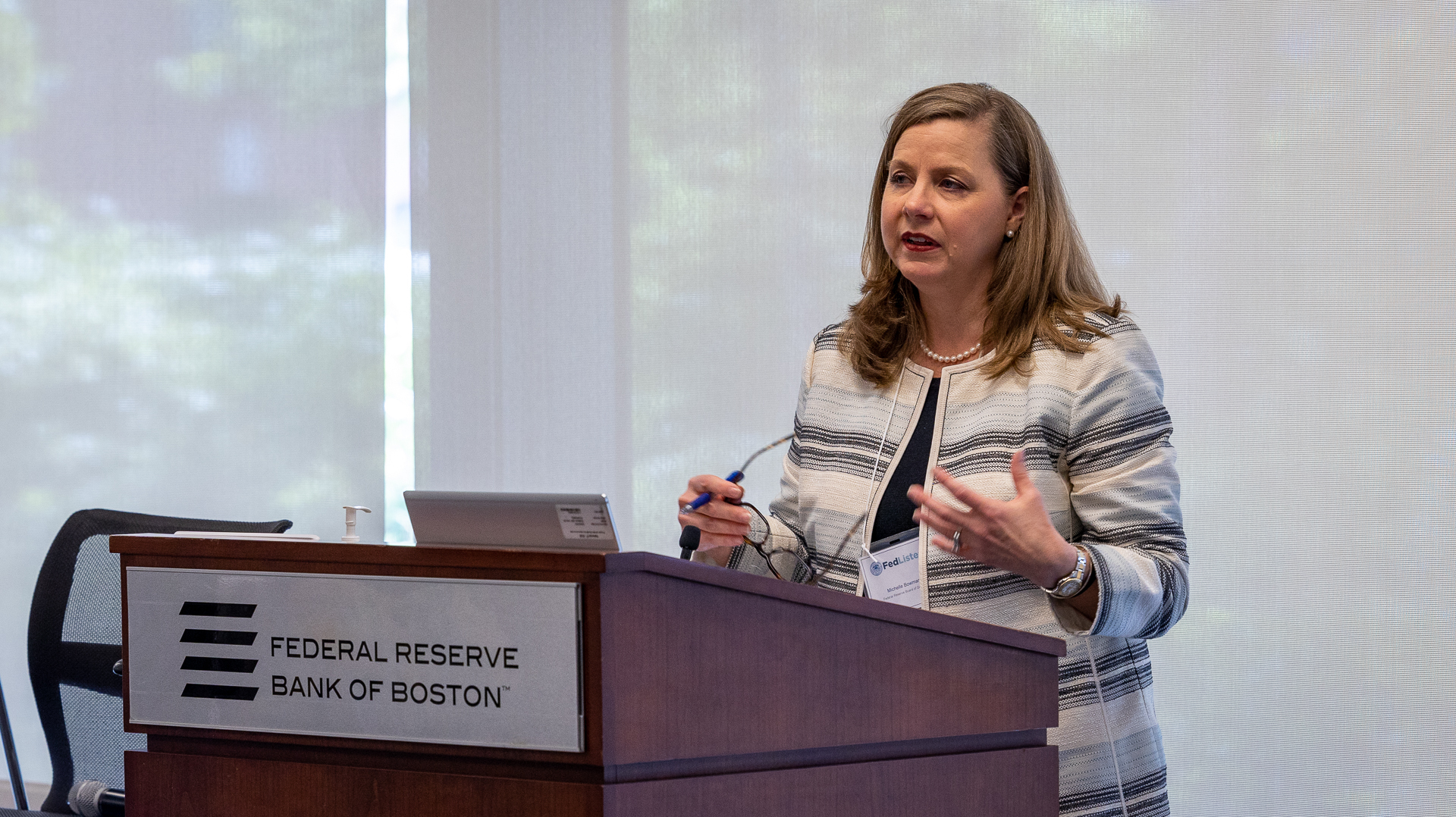How is New England transitioning to a ‘post-pandemic’ economy? 
Housing out front as Board of Governors, Boston Fed seek local views at FedListens event 
The Federal Reserve’s FedListens event Wednesday was a forum for New Englanders to voice their top economic priorities and concerns to the System’s Board of Governors and regional Fed officials. One topic that came up repeatedly, and with urgency, was housing.
Participants said there’s no place to escape the region’s high housing costs. Rebecca Hatfield, who leads the nonprofit Avesta Housing, said applications for affordable apartments in their Maine and New Hampshire properties have nearly doubled since 2020.
“The level of desperation is much higher than it used to be, and it’s affecting more people than we have ever seen in the past,” she said.
The Federal Reserve Bank of Boston hosted the FedListens event, “Transitioning to the Post-pandemic Economy,” as part of an ongoing series led by the Board of Governors to hear about the everyday impacts of monetary policy.
While housing was front and center, it wasn’t the only issue on the table for discussion. Panelists also talked about the labor market and local and state government fiscal health following COVID-19. Attendees at the Bank offered comments after the panels, and those who watched a livestream shared their perspectives with the Board through a survey.
“Learning about the experiences behind (economic) data helps bring (it) to life,” said Board Governor Michelle W. Bowman.
“Our goal is really to … deepen our understanding of the range of post-pandemic experiences – the challenges but also the opportunities – that face our region and our economy,” said Boston Fed President and CEO Susan M. Collins.
Panelists: Pandemic brought long-term housing issues to a head
Regional housing costs have always been high, but the pandemic made things worse by exacerbating trends such as the underproduction of housing, according to Melissa Kaplan-Macey, the Connecticut director of the Regional Planning Association.
“The pandemic accelerated a lot of the trends we were already seeing,” she said.
Some supply chain issues that started during the pandemic persist, said Patrick Lee, president of development firm Trinity Financial. That means projects can take longer and cost more, he said.
A lack of affordable housing in New Hampshire and Vermont directly impacts an employer’s ability to bring talent to rural areas, according to Carolyn Isabelle, director of workforce development and planning for New Hampshire-based Dartmouth Health.
“We’ve seen people withdraw their (job acceptances) once they started looking to relocate to our area,” she said. “When the only apartments available for rent are $2,500 a month, it’s a no-go.”
10 images

Employers adapt strategies to attract and retain younger employees, working parents
Difficulties finding workers was a related and key concern for attendees.
Mary Nash, vice president of talent development at Beth Israel Lahey Health in Boston said healthcare employers are grappling with shortages of nurses, doctors, and support services, due in part to many recent retirements.
An aging workforce is also a concern in construction, said Jeysi Zuniga, president and CEO of Synergy Contracting. She said her company is focusing on connecting with younger workers through trade schools, and it has successfully retained single mothers by offering more time flexibility and negotiation.
Matt Schlobohm, executive director of the Maine AFL-CIO, said employer recruitment strategies need to become more adaptive following the pandemic. He said the union recently launched a free pre-apprentice program that helps provide new workers with basic training and job connections.
“We had 15 slots and 75 applicants,” Schlobohm said. “We have to think about how to change old models that worked in a slack labor market.”
Communities must adjust to end of unprecedented COVID-19 funding levels
The unprecedented level of federal funding during COVID-19 was discussed Thursday, as communities are faced with things returning to normal.
Ted Brady, executive director of the Vermont League of Cities and Town noted: “For the first time since the 1970s, the federal government showed up with almost a blank check for state governments.”
Paul Dion, director of Rhode Island’s Pandemic Recovery Office, said it will be critical for states to manage expectations going forward as pandemic-era federal funding ends.
Doug Howgate, president of the Massachusetts Taxpayers Association, said he thinks some state programs started during the pandemic – such as increased efforts to support child care and address food insecurity – may be made permanent. But he added that funding alone isn’t the solution to every problem. For example, Massachusetts has spent a lot of money on workforce and housing, but the state is still facing issues in both areas, he said.
“For some of these issues that are so critical for all northeastern states, … I think you see that these are not easy problems to solve, even when you have resources,” Howgate said.
Learn more about FedListens and watch a recording of the event on bostonfed.org.
Media Inquiries? 
Contact our media relations team. We connect journalists with Boston Fed economists, researchers, and leadership and a variety of other resources.

 About the Authors
About the Authors
Amanda Blanco is a member of the communications team at the Federal Reserve Bank of Boston.
Email: Amanda.Blanco@bos.frb.org
Site Topics
Keywords
- workforce development ,
- Labor Market ,
- housing ,
- COVID-19 in New England ,
- FedListens






